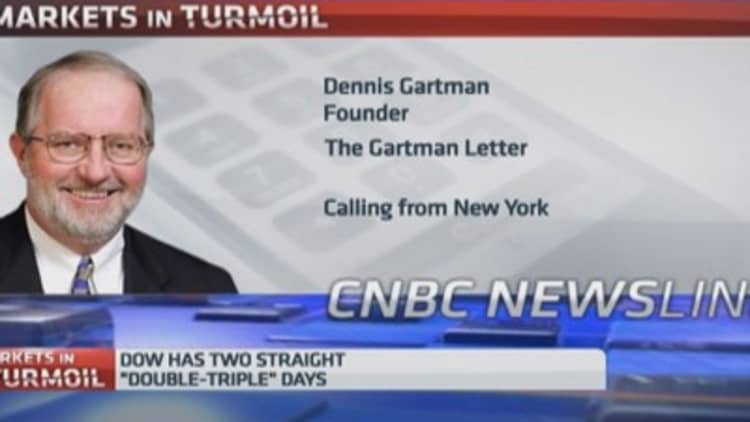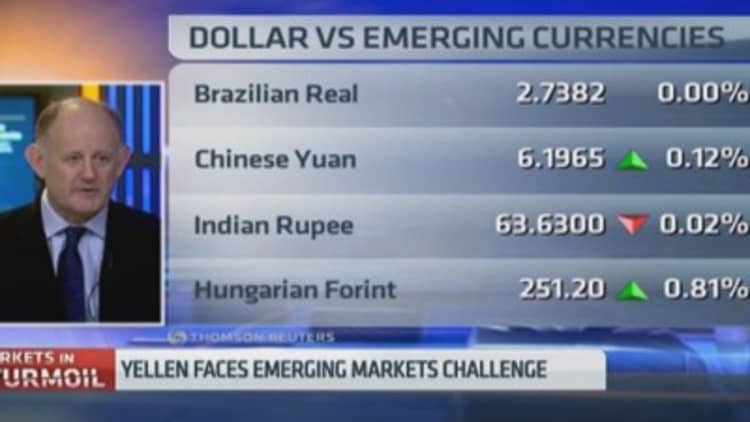
The U.S. Federal Reserve is meeting on Wednesday against a backdrop of downward pressure on prices, but don't expect any surprises on Wednesday, noted investor Dennis Gartman told CNBC.
The Fed's latest meeting comes amid plunging oil prices, which are likely to impact the U.S.'s closely-watched inflation figures looking ahead.
When considered alongside improving employment data, however, Gartman, founder and editor of the closely-watched The Gartman Letter, said the current economic situation was "nicely, pleasantly balanced."
Fed Chair Janet Yellen is widely expected to tweak the language in the central bank's statement by removing the phrase "considerable time" in reference to how long it intends to keep rates low. But it is not expected to be deterred from hiking rates, despite global economic headwinds, in mid-2015.
Read MoreThe Fed could soothe markets Wednesday
"Dr Yellen and Dr Fisher (Dallas Fed President Richard Fisher) will look at both sides and say: 'Yes, inflation is low so that'll allow us to venture towards further easing. However, the unemployment rate and employment rates are moving in our favour, that'll favor moving towards higher rates," Gartman told CNBC's "Worldwide Exchange."
He said that he too believed the Fed would change its language on Wednesday, but added: "Are they going to make any (other) changes? No, none whatsoever."
The central bank's statement and economic forecasts are due at 2 p.m. ET, followed by a briefing by Fed Chair Janet Yellen at 2:30 p.m.
Derek Halpenny, European head of global currency research at the Bank of Tokyo-Mitsubishi, said in a note that he expected the "considerable time" reference in the Fed's statement to be replaced with something like "patient."
"That scenario seems widely expected at this stage but may still prompt some initial market volatility," he said. "For Chair Yellen we expect her to emphasise the 'data dependent' nature of monetary policy decisions ahead."
Oil prices 'will move lower'
The Fed is not expected to increase interest rates until unemployment has fallen further and inflation has hit its target. And although unemployment is relatively low - at 5.8 percent in November - falling global oil prices have halted consumer price growth.
Read MoreFed should focus on US, not Russia: LaVorgna
Gartman added that he was not sure that the oil price had bottomed out yet – despite benchmark Brent crude dropping below $60 this week – near five year lows.
"I continue to think that prices will move lower but for the first time in weeks I'm not overtly bearish of crude oil, I'm moderately bearish of crude oil," he said.
QE to blame for volatility?

One analyst told CNBC that the current market volatility – particularly in the oil market – was a result of the end of the Federal Reserve's monthly bond-buying – or quantitative easing (QE) – program. Designed to stimulate the economy, it was finally dispensed with in October.
"We've passed the end of QE in the U.S. (and have moved) towards talking about if and when we'll get a rate rise," Kit Juckes, global macro strategist at Societe Generale, told CNBC.
"We've taken commodity prices, oil prices and emerging market currencies to incredibly high levels from which they're coming back…. All that's playing out in volatility that was suppressed by quantitative easing and is now back with a vengeance."
Juckes added that although the Fed might be tempted to keep rates lower in the face of low inflation, it would be a "major risk" to do so.
- By CNBC's Holly Ellyatt, follow her on Twitter @HollyEllyatt.


